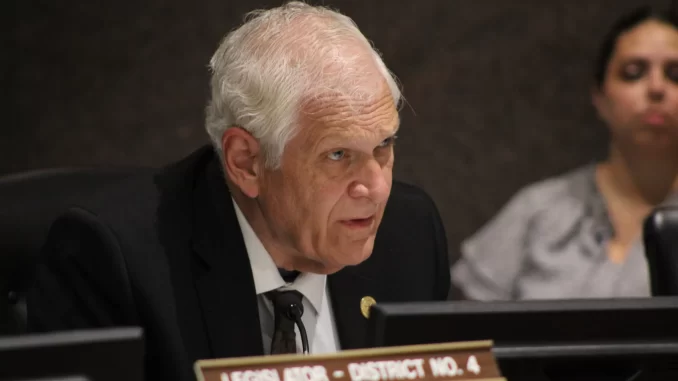
“I would actually argue the opposite because customers are receiving these takeout accessories by default and not by choice,” said Schwerzmann. “Right now, we have an op-out model that doesn’t work. The default is to include takeout accessories in every order, which becomes muscle memory for the staff. Those of us who attempt to avoid takeout stuff often find that refusing it does not work.”
Schwerzmann said that the initiative is comparable to the plastic bag laws, saying that while people thought it would be a hassle, it eventually became accepted as “the new normal.”
George Hoffman, a member of the Setauket Harbor Task Force, also spoke in favor of the legislation, saying that “thirty billion tons of plastic” are floating our harbors, bays, and rivers around the world. Hoffman mentioned the Pacific Garbage Patch, a figurative example of the microplastics in the world’s oceans. A common misconception is that the garbage patch is visible “twice the size of Texas,” as Hoffman put it.
“I don’t think any of us want to live in a world where our oceans and harbors and bays are just chock full of floating plastic. So, I think that this bill is a good first step,” said Hoffman.
Hoffman said that recent beach cleanups show a myriad of single-use plastic knives and forks. He said when the Legislature took a similar initiative against plastic bags, beach cleanup teams find “hardly any” plastic bags anymore.
While Majority Leader Nick Caracappa (C-Selden) doesn’t disagree with the intent of the legislation, he expressed reservations about enforcement.
“In a perfect world, this would be fantastic, but we don’t have recycling police,” said Caracappa. “People are going to be people, and it’s unfortunate.” Caracappa said that as far as littering and waste reduction, there are those who practice environmentally-friendly habits and those who don’t.
“I don’t see how it’s [I.R. 1371] going to help because if people are going to throw their plastic, leave it on the beach, or throw it in the street – I believe it happens every single day – there’s nothing that’s going to deter them unless we go after the litterers,” said Caracappa, adding that if the Legislature were to approve the bill, it would be putting “laws on the books that cannot be enforced.”
John Turner, an advocate with the Seatuck Environmental Association, said that enforcement of the bill comes in the form of the Suffolk County Health Department staging a public information campaign, something that Englebright and Legislator Leslie Kennedy (R-Nesconset) worked to include.
“The main benefit of this legislation is not punitive,” said Turner. “It’s to try to educate the public because a lot of us are frustrated when we receive those utensils, condiment packages, and other things we didn’t want when we get our takeout order.”
Legislator Englebright invoked the “three R’s:” reduce, reuse, and recycle, saying that the most important “R” is “reduce.”
“This bill attempts to focus on the highest priority, which is “reduce,” the best “R,” said Englebright.
Englebright said that microplastics are becoming more pervasive in the environment and in the human body, including, but not limited to, the human bloodstream, the brain, and the reproductive system.
All seventeen Legislators present voted unanimously to close the public portion for the bill. Legislator Stephanie Bontempi (R-Centerport) was absent.

